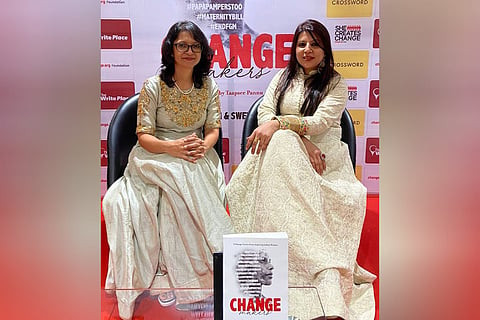

As a child, Chandana Hiran grew up to the constant nagging of people who advised her to try skin-whitening remedies. Fairness cream commercials that projected dark-skinned women as failures scarred her. Years later, she went on to launch the #AllShadesAreLovely campaign against colourism, which was instrumental in popular fairness cream brand Fair & Lovely changing its name to Glow & Lovely.
Chandana is among the 11 women activists whose stories have been featured in the book Changemakers. From online campaigns such as #BattiJalao, #MaternityBill and #ENDFGM to petitions that led to policy changes, co-authors Almas Virani, a public speaking and podcast coach who writes on gender, and Sweta Samota, author & book coach, turn the spotlight on women whose activism brought in tangible changes on the ground.
The book is part of digital activism platform Change.org’s
“We felt that revisiting their childhood and gradually moving from one incident to the other would strike a chord among readers, which in turn might inspire them to introspect about the causes they’d like to support,” she adds.
The foreword by actor Taapsee Pannu is also reflective of the vision shared by the authors. “India is on the cusp of this change, where women have finally found their voice after decades. A voice that’s not easy to shush down. In fact, it rises higher every time it’s silenced,” an excerpt from the foreword reads.
The authors believe that the book will change readers’ perceptions about digital activism and the common misconception that petitions go viral and get the job done overnight. On the contrary, it is a painstaking affair for campaigners whose objective is realised only through consistent efforts.
“Her story is deep-rooted in patriarchy, watered with comments around the dowry her parents would need to pay because of her skin colour or the constant advice around the application of malai or haldi to make her fairer,” a line from Chandana Hiran’s chapter reads. When she decided to start an online campaign to fight against colourism, Chandana thought about demanding a ban on fairness creams.
But upon further introspection and research, she zeroed in on specific goals and launched a campaign requesting International Indian Film Academy Awards (IIFA) to make a statement condemning Bollywood songs such as ‘Chittiyan Kalaiyan’ and ‘Zandu balm’ that objectify women. Although IIFA failed to act on her campaign #WomenNotObjects in 2019, Chandana went on to work on several campaigns and continued to speak up on several gender-based issues, gaining traction among many social media users, including celebrities. It was only in May 2020, when the Black Lives Matter movement gained momentum globally, that Chandana’s campaign #AllShadesAreLovely took off and became successful.
Much like the journeys of the women the book is based on, Almas and Sweta share how the process of writing the book was also multifaceted and a gradual one. “It was both difficult and beautiful. We spoke to each one of them over many online calls. We had a lot of questions that would lead to hours of conversations. It took so much time for some of them to narrate their stories and open up. We had to then go back and comprehend what they said, interpret it and then figure out the best way to put across their stories. The entire process of publishing the book took almost two years,” Almas shares.
Both authors underline how speaking to the women, though enriching, was also arduous. It required the latter to revisit traumatic and triggering experiences from their past.
Long before Masooma Ranalvi, the founder of WeSpeakOut, a collective that aims to ban Female Genital Mutilation/Cutting (FGM/C), wrote an open letter to the Prime Minister asking for a law to ban FGM, she had to come in terms with her internal turmoil. For Masooma, a FGM survivor, the road to activism came with trials and tribulations. Almas and Sweta illustrate how Masooma, who was initially in denial about her traumatic experience with FGM as a child, turned into a torchbearer for the cause.
For gender rights activist Srilekha Chakraborty who worked in remote parts of Jharkhand to raise awareness about marital rape, violence, menstruation, gender and sexuality, acknowledging her struggles with identity played a huge role in her activism. Srilekha had difficulties fitting in as a child and hence decided to work with marginalised communities. “For the first time she had a weapon to carve new stories out of the discrimination that she encountered,” an excerpt from Srilekha’s chapter ‘The misfit changemaker’ reads, adding that it enabled her to course correct and fight discriminatory practices in the communities she worked with.
The other women featured in the book are Cassandra Mendosa (#SaveAarey, #BattiJalao), Garvita Gulhati (#GlassHalfFull), Jincy Varghese (#MaternityBill), Neha Shrimal (#ProtectOurKids), Priyanka Gupta (#PassportReform), Seema Mishra (#CleanTheMess) and the authors themselves – Almas (#OneRupeeJoke) and Sweta (#SwachhMarathon).
Shedding tears of joy and sorrow along with the changemakers who narrated their stories was unique and challenging in equal parts, says Sweta. “We wanted to uncover layers. For some, that meant revisiting traumatic experiences while for others sharing their stories was therapeutic. Their opening up to us also made us realise how they are all in different levels of healing,” she shares. Sweta also adds that for some of the women, looking at their lives retrospectively gave them a new perspective and allowed them to view events in the larger scheme of things.
When quizzed about further instalments, Almas assures us that it is definitely not going to be the only book. “I’ve been wanting to start a podcast and amplify the voices of women from Change.org’s ‘She creates change’ programme. So, we will work on a sequel or other projects such as a podcast in the future,” she says.
The book is available for purchase here.